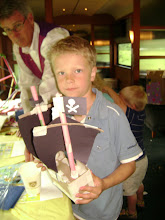The horrible earthquake, followed by a Tsunami, in Japan should wake any Westcoaster up. Japan's earthquake - at 8.9 had a hundred times more force than Haiti's. Haiti's was, according to Wikipedia, 7.0. I don't know what each number means on the Richter Scale, but there is a huge difference between a 7 and an, almost, 9.
The 8.9 looked like a 5 or 6 earthquake on the videos, no windows busting out, no collapsed buildings. The only hint of the huge force of it was the the people's reactions. Some fell on the sidewalk and most seemed scared. For a country used to earthquakes, that was a clue this was huge. The reason the videos fooled us was Japan's incredible engineering. It is amazing to watch those huge buildings swaying, yet holding up. Christchurch crumbled and Haiti collapsed with much less force.
The horrible part was the Tsunami, breakwaters cannot stop the force of a 10 meter high wave. And watching the video, it appears nothing can.
Which makes me think of the great benefits of our ancestors' way of life. A hunter-gatherer would just pick up a fallen tent, and keep going after an 8.9 quake. Everyone has to run from a Tsunami, but the hunter-gatherer will have a much easier time rebuilding his life.
My thoughts as I feel as vulnerable - realizing how fleeting life, safety and/or security is.
My other thoughts are, when God provides for our needs - our needs for survival are pretty basic. If he answered the Hunters need, they would find a flint to make into spear or a deer in their path. Our basic needs are really food, clean water, and shelter/clothing to protect us from the elements. A tent, water and rice and beans are really all we need in temperate climate - along with outdoor wear, and good boots. Maybe I should put these in an earthquake kit. Are we entitled to more because we choose such a complicated life?
Let me add:
I am shocked and saddened by what I have seen on the videos. I cried when I saw the cars driving, yet the waves approaching. I live on the Westcoast, in that same 'Ring of Fire' and am under no illusion that we are any safer. In fact, I think we are less so, none of our infrastructure has been tested by a 6.5 or 7 earthquake, let alone an 8.9. If one does strike, I doubt we will fare as well as Japan. Tsunamis have ways of twisting and weaving, and Islands of supposed protection may be bypassed and areas of perceived safety may get hit. I am pondering what I expect from God - safety, security, things I feel I need and reality. Does God promise us wealth and abundance, or just the basics?
The 8.9 looked like a 5 or 6 earthquake on the videos, no windows busting out, no collapsed buildings. The only hint of the huge force of it was the the people's reactions. Some fell on the sidewalk and most seemed scared. For a country used to earthquakes, that was a clue this was huge. The reason the videos fooled us was Japan's incredible engineering. It is amazing to watch those huge buildings swaying, yet holding up. Christchurch crumbled and Haiti collapsed with much less force.
The horrible part was the Tsunami, breakwaters cannot stop the force of a 10 meter high wave. And watching the video, it appears nothing can.
Which makes me think of the great benefits of our ancestors' way of life. A hunter-gatherer would just pick up a fallen tent, and keep going after an 8.9 quake. Everyone has to run from a Tsunami, but the hunter-gatherer will have a much easier time rebuilding his life.
My thoughts as I feel as vulnerable - realizing how fleeting life, safety and/or security is.
My other thoughts are, when God provides for our needs - our needs for survival are pretty basic. If he answered the Hunters need, they would find a flint to make into spear or a deer in their path. Our basic needs are really food, clean water, and shelter/clothing to protect us from the elements. A tent, water and rice and beans are really all we need in temperate climate - along with outdoor wear, and good boots. Maybe I should put these in an earthquake kit. Are we entitled to more because we choose such a complicated life?
Let me add:
I am shocked and saddened by what I have seen on the videos. I cried when I saw the cars driving, yet the waves approaching. I live on the Westcoast, in that same 'Ring of Fire' and am under no illusion that we are any safer. In fact, I think we are less so, none of our infrastructure has been tested by a 6.5 or 7 earthquake, let alone an 8.9. If one does strike, I doubt we will fare as well as Japan. Tsunamis have ways of twisting and weaving, and Islands of supposed protection may be bypassed and areas of perceived safety may get hit. I am pondering what I expect from God - safety, security, things I feel I need and reality. Does God promise us wealth and abundance, or just the basics?
